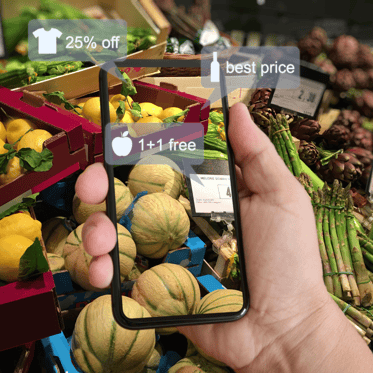If you’ve been keeping up with our AI series, you’ve probably put together that by leveraging the power of artificial intelligence, marketers can now deliver highly personalized and targeted content. Over 31% of marketers say the top success story they see with AI is getting a better understanding of the customer.
AI In Marketing Action
AI paves the way for more efficient, data-driven, and customer-centric marketing strategies. The impact of AI technologies on business will boost productivity by up to 40%. AI-powered automation streamlines marketing tasks, from data analysis to content generation to customer interactions. With AI automating painstaking tasks, you’re left with more time to channel all those creative juices to charge up your strategy and take your company to the next level.
Through the extensive amount of data AI sorts through, it’s able to pull impressive insights about your audiences’ behavior, preferences, and trends so you can refine your marketing strategies and uniquely target your audience. Hyper-personalized marketing campaigns are no longer impossible when you’re using AI to tailor content and recommendations to individuals. With AI by your side, your potential for growth across every sector of your marketing strategy skyrockets.
Using AI for Social Media
AI energizes marketers with a plethora of optimization tools for social media campaigns of every kind so they can captivate and connect with their audience like never before. From content recommendations tailored to personal preferences, to sentiment analysis and social listening, providing insights into emotions and opinions, AI is the powerhouse that takes campaigns to the next level. Then we have image and video recognition algorithms to make sure content settings are safe and categorized. Not to mention influencer marketing tools, precise targeting, and trend analysis are extremely effective when AI is used to power them.
Along with AI’s tremendous potential come ethical concerns, meaning that marketers must place transparency, fairness, and robust data protection measures at the forefront of their social efforts. As AI advances, it will become even more immersive. AI integration into augmented reality (AR), virtual reality (VR), and live video streaming, will forever change the way we engage with content. Social media platforms are set to become seamlessly integrated into our daily lives, shaping the way we connect, share, and experience the world.
Learn more in our blog: AI and Social Media
AI and SEO
Automating keyword research, content optimization, and performance tracking enable new ways for search engine algorithms to personalize and provide relevant search results, while NLP algorithms help understand user intent and behavior. AI and SEO’s potential extends to content creation, with AI generating content and suggesting optimization improvements, although oversight remains crucial for maintaining authenticity and quality. With AI’s technical expertise automating website crawling, indexing, and identifying issues like broken links, user experiences, and website performance have never seen better days.
Transparency, fairness, and user privacy are hot topics that need to be considered when implementing AI in SEO efforts, and addressing biases in search results remains a challenge. When these concerns are addressed, AI and SEO are quite the dynamic duo, leveraging AI's analytical capabilities and automation to boost SEO's creative and strategic expertise. Together, they offer endless possibilities for marketers, enabling them to stay ahead of the digital marketing curve, deliver personalized experiences, and shape the future of digital marketing. This partnership is set to continue evolving and revolutionizing the way we search, engage, and discover.
Learn more in our blog: AI and SEO
Content Marketing AI
AI is transforming every stage of the content journey. Starting with content creation and ending with the distribution process, marketers should be using AI tools to streamline their content marketing. AI-powered content creation not only boosts efficiency but also inspires creativity by analyzing data and providing valuable insights to help marketers brainstorm in new ways. Content personalization reaches new heights when marketers can deliver tailored experiences using AI, which improves engagement and customer satisfaction. Additionally, content curation and recommendations, help marketers provide practical information to their audience while following performance and tracking trends.
Finding the equilibrium between personalization and creativity while maintaining transparency and fairness is crucial. As AI continues to advance, opportunities in content marketing are expanding, with new technologies like Natural Language Generation (NLG) and AI-powered voice assistants. Boosting productivity, enhancing content quality, and delivering more personalized and effective content to their target audience, are just the beginning, setting the stage for future success across industries.
Learn more in our blog: AI and Content MarketingAI for Design
Generative AI’s integration in marketing offers new ways to create content and solve creative dilemmas. AI is an empowering tool for designers of the future providing fresh creative insights, allowing creators to focus on wherever their imagination takes them. Collaborating with AI is a promising feature for design. With AI as your creative assistant, the boundaries of creativity are limitless. When it comes to user-centric design, AI enhances user experiences through personalization, trend analysis, and usability testing. The bright future of AI in design brings the power of even more sophisticated applications and augmented reality (AR) integration.
As AI shines light into every corner of the design space, it’s transforming how problems are solved and ideas are generated. Embracing emerging technologies and the evolving role of AI in design will be essential for staying at the forefront of innovative design practices, ensuring a bright future for creativity and problem-solving across industries.
Learn more in our blog: AI and Design
Video and AI
When it comes to video, AI is increasing the level of accessibility and efficiency for creators. New AI video creation and editing tools leverage machine learning algorithms to automate tasks like scene identification, color correction, and even generating entire video content. This not only saves time but also opens up creative possibilities, allowing marketers to deliver engaging videos more quickly. AI's role in video analysis is equally game-changing, with object detection and recognition enabling improved content organization and search. AI-enhanced video recommendation and personalization algorithms cater to individual viewer preferences, enhancing user engagement and satisfaction. Even video advertising is positively impacted by AI, in terms of targeting, and monetization. Integrating AI into video applications allows you to create relevant content for your audiences and optimize revenue.
The future of AI in video promises even more refinement, including advanced analysis, object recognition, scene understanding, and real-time processing. AI-driven virtual and augmented reality experiences are set to further transform immersive video encounters. Video editing AI tools will continue to evolve, enhancing their ability to automate complex tasks and improve content quality. As AI technologies advance, the video landscape will continue to grow, enriching user experiences and creating new opportunities for creators while maintaining trust and integrity in video content.
Learn more in our blog: AI and Video
AI for Email Marketing
The future of marketing is all about highly personalized content, and AI brings it to email campaigns. AI-driven email marketing focuses on personalization, segmentation, optimization, automation, and analytics. By helping deliver tailored content to their unique audience, improving engagement, conversion rates, and customer experiences, AI gives marketers a leg up. AI has also made strides in email personalization, analyzing user behavior and preferences, and going beyond traditional approaches to create the best content for specific segments. Using AI for email marketing can help guide your subject lines and copy, make suggested send times, automate email sequences based on behavior, and provide predictive email engagement and conversion outcomes in your email lists. With AI, you can ensure clean and targeted email lists for better deliverability.
Helping you plan for future campaigns is an added benefit, as AI provides intelligent analytics, offering real-time insights into campaign performance, conversions, and return on investment. The future of AI in email marketing promises even more advanced personalization, automation, and analytics, setting the stage for continued growth and innovation in the field.
Learn more in our blog: AI and Email Marketing
Marketing Strategy & AI
There are so many ways to leverage AI in your marketing strategy, hence the reason it’s a central topic in today’s marketing world. AI is being used to automate tasks, improve efficiency, and unleash creativity across various marketing platforms. It's estimated that over 70% of high-performing marketers have a well-defined AI strategy in place. AI is revolutionizing marketing by enabling personalization, data-driven decision-making, and enhanced customer engagement. AI's role in marketing spans from content creation to predictive analytics, and all the in-between. AI-driven algorithms help marketers tailor their strategies to individual segments, optimize campaigns, provide real-time support, score leads, and personalize content.
With all this crazy potential, it’s important to use AI ethically. Fairness, transparency, and data privacy need to be ensured in order to maintain good relationships with your audience. As AI technology continues to evolve, it’s destined to reshape traditional marketing, motivating businesses to build deeper connections and push innovation in their strategies. Companies that effectively leverage AI are poised to stay competitive and adapt for the future.
Learn more in our blog: AI and Marketing Strategy
AI for Market Research
AI doesn't just handle data; it transforms it into valuable insights that drive smarter decisions and more successful marketing strategies. It's a powerful tool that, when combined with human expertise, leads to a deeper understanding of audience behavior and trends, ultimately contributing to a company's overall success. AI-driven market research is revolutionizing the way businesses gather insights and make informed decisions. These tools collect information from millions of sources, so you can anticipate market trends and customer behaviors. By analyzing historical data and external factors, AI can provide precise forecasts, empowering companies to proactively adjust strategies and seize opportunities ahead of competitors.
The integration of AI with IoT and blockchain further improves market research by generating real-time data from mixed sources and securing data transparency. With this being said, it's crucial to recognize that AI is most effective when working in tandem with your expertise. AI is a tool to be used alongside the brain. Embracing AI opens the door to a new era of research methodologies that are faster, more accurate, and adaptable to swift market changes.
Learn more in our blog: AI and Market Research
10 Best Practices For AI Marketing
Over 51% of executives say their primary goal for using AI is to enhance the features, functions, and performance. Enhancing features, functions, and performance through AI is a common goal for innovative businesses. To achieve this objective effectively, businesses should work towards a strategy that uses these 10 best practices:
1. Make your Objectives Clear
Begin by defining specific goals and outcomes you want to achieve with AI. Having clear objectives will guide your AI initiatives, from product improvement to streamlined processes, or enhanced performance.
2. Understand your Pool of Resources
Make sure that you have access to high-quality and relevant data. AI relies on data, so having clean and comprehensive datasets is the foundation of precise and meaningful insights.
3. Collaborate With Your Team
All of your AI initiatives should involve collaboration across teams within your business and the partners you are working with. Walk in with an open mind and encourage genuine communication and knowledge sharing.
4. Invest in AI
Hiring or upskilling employees with expertise in AI and machine learning is a good option when it comes to building your business’ AI repertoire. Having a qualified team is vital when you're implementing and managing any new initiatives, especially in the uncharted waters of AI projects. AI technologies are evolving rapidly, so Invest in ongoing training and development to keep your team up-to-date with the latest advancements and best practices.

5. Find the Right Tools for You
Choose AI platforms that align with your objectives and business values. Some of the most important things to consider are factors like scalability, compatibility with existing systems, and ease of use.
6. Always Be Ethical
Be mindful of ethical and privacy considerations when implementing AI. Ensure that your AI applications adhere to relevant regulations and respect user privacy.
8. Start off Small
Start with pilot AI projects to test the waters and validate concepts before pouring everything you’ve got into an AI strategy. This approach lowers risks and allows for fine-tuning.
9. Use Results to Make Improvements
Implementing KPIs and metrics to measure the impact of AI on enhancing features and functions helps you see a clear trajectory of your strategy. Regularly analyze the results and make adjustments accordingly. AI is an iterative process. Use insights from your AI initiatives to refine and improve features, functions, and overall performance continually, so you can switch gears seamlessly.
10. Audience First, Always
Keep the customer in mind throughout your AI journey. All of your AI experiments should align with client needs and expectations. AI can be vulnerable to attacks, so robust security practices are essential. One way to hone in on this is by prioritizing cybersecurity measures to protect your AI systems and the data they rely on.
By following these best practices, businesses can grow alongside the rising influence of AI to enrich features, functions, and performance. Working with AI is a great way to launch innovation and competitiveness in your business into the stratosphere.
“The future of marketing is about the future of experiences.” In his keynote, Nikos Acuna provided attendees with a look into the marketing crystal ball. He offered a sneak peek into the future relationship status of AI and marketing, revealing that experiences will continue to fuse the physical and digital worlds. AI keeps striding forward, the spotlight must remain on the customer journey. By leveraging AI's capabilities, businesses can deliver highly personalized and targeted content, gaining a better understanding of their customers, which is the key to success.





